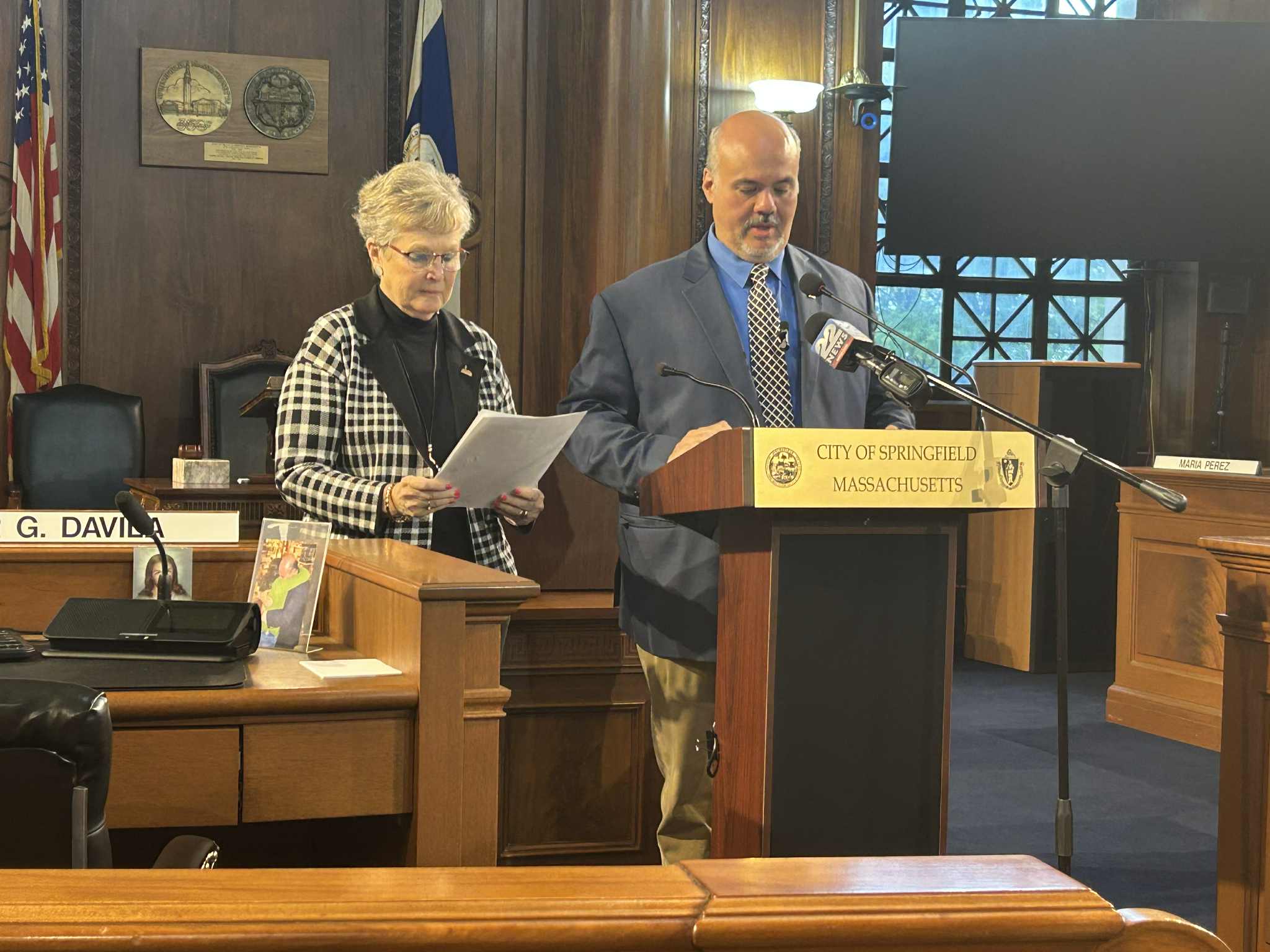Ward 6 City Councilor Victor Davila and At Large City Councilor Kateri Walsh present findings researched by the City Council’s Pilot and New Revenue Subcommittee.
Reminder Publishing photo by Ryan Feyre
SPRINGFIELD — The city’s Pilot and New Revenue Subcommittee believes that the city is leaving millions of dollars of revenue on the table due to a dearth of payment in-lieu of taxes agreements.
According to the committee’s findings, the city’s total PILOT revenue is less than 1% of the total valuation of tax-exempt land in Springfield.
That figure — according to committee members — is far from enough to mitigate some of the property tax burdens and citywide budgetary pressures Springfield continues to face.
Therefore, after over a year-and-a-half of research and meetings, the subcommittee — consisting of Ward 6 City Councilor Victor Davila and Springfield residents Juan Latorre and Karen Lee — is proposing that Springfield hire the Edward J. Collins Center for Public Engagement and the Lown Institute to help develop a PILOT policy for the city.
The goal of a new policy, according to Davila, is to strengthen the negotiation and research process when the city is seeking a PILOT agreement with its nonprofits.
“The city doesn’t have a policy on proceedings, and that has resulted in underpayments and overpayments to the city of Springfield,” said Davila, the chair of the subcommittee. “We’ve also learned that these agreements have always been a handshake. And that cannot be the case. We need to have a policy. We need to have a written agreement, so that we all know what’s what, so there’s no confusion.”
Davila gathered media at City Hall on Oct. 20 to present the committee’s findings. According to their research, there are 2,335 tax-exempt parcels assessed at $4.8 billion in Springfield. The city, however, only receives less than $300,000 annually via PILOT payments from 15 entities, 12 of which are owned by the Mental Health Association, and one of which — the Center for Ecological Technology — closed this year.
He argued that if nonprofits in the city — such as hospitals, colleges, the housing authority and churches — were to pay up to 25% in what they would have owed in property taxes, the city would bring in an additional $20 million in revenue.
Davila said the committee plans on working with Mayor Domenic Sarno and the full City Council on securing the funding for the purpose of hiring the Colins Center and Lown Institute.
The committee argued that hiring these outside sources will make the PILOT agreement process more neutral and take politics out of the equation.
“What we’re asking is $40,000 to hire the Collins Center to yield a potential $20 million in revenue to the city,” Davila said. “$20 million of potential new revenue could come into the city with a PILOT policy and engaging nonprofits for pilot programs.”
PILOT agreements are voluntary, according to the committee. Currently, the city has a 10-year agreement with Baystate Medical Center that ends in 2027. The four properties that are a part of that agreement were assessed at $10,668,900 in fiscal year 2024 and paid a PILOT amount of $243,279 in that same year.
The city also has a 20-year PILOT agreement with a Springfield Technical Community College property on 1447-1451 Worthington St. where the college paid a PILOT amount of $3,992. According to the committee’s findings, that property had an assessed value of $458,800 in FY24.
The committee recommends that all nonprofit entities in the city be considered for potential PILOT agreements and not limited to organizations with over $15 million in assessed value, as was proposed in recent state legislation.
“When friends need help, friends step up,” Davila said. “We do consider the colleges and hospitals to be our strategic partners, and we do need help.”
Davila said the extra revenue is needed because without it, residents and small businesses will continue to see property taxes rise every year.
He argued that an influx of PILOT agreements will bring more consistent revenue to support city investments and will allow more opportunity to highlight the work nonprofits do in the city.
“To allow the city to continue to make necessary investments, both in services and infrastructure, as well as limit property tax increases, the city must identify new funding sources,” the committee’s summary read. “Nonprofits do utilize city resources, including police, fire, EMS, DPW and more. Asking nonprofits, especially those with large properties in Springfield, support the city through a PILOT agreement, is an appropriate solution.”
At Large City Councilor Kateri Walsh, who was present at the Oct. 20 press conference, agreed with the committee’s sentiment and offered her support of finding new ways to bring revenue through PILOT agreements.
“In the uncertain times we’re in, I think it’s prudent to look at other sources of revenue for the city of Springfield,” Walsh said. “I think all of this information will be helpful in convincing people that there are other ways to raise funds.”



